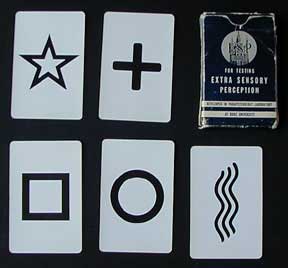 A number of key concepts in assessment can be illustrated by considering the
challenges and ultimate outcome of efforts to measure ExtraSensory Perception.
A number of key concepts in assessment can be illustrated by considering the
challenges and ultimate outcome of efforts to measure ExtraSensory Perception.
 A number of key concepts in assessment can be illustrated by considering the
challenges and ultimate outcome of efforts to measure ExtraSensory Perception.
A number of key concepts in assessment can be illustrated by considering the
challenges and ultimate outcome of efforts to measure ExtraSensory Perception.
The first task in measurement is to precisely specify the "thing" you are trying to measure.
This is a problem with ESP. ESP is popularily understood to come in several forms. The two primarily examined with these cards are
1. reading another person's mind (telepathy) and
2. predicting the future (precognition).
To evaluate reading someone's
mind you would have one person concentrate on a randomly chosen design among
the 5 options and the receiving person would have to identify which sign was
being "sent." You know how frequently each design would occur by chance
in this deck and you expect that a person with ESP should beat the odds: the
receiver would get more than chance. 
But whose ESP talent is working, the sender's or the receiver's?
And maybe, it is precognition. Perhaps the receiver is figuring out what cards will be coming up.
It turns out not to matter. Research results failed to reveal anyone who could consistently "beat the deck" when all alternate explanations were controlled. By chance you would expect occasional runs of accuracy (and occasional runs of inaccuracy).
Basically, they couldn't get a reliable measure. And without a reliable measure, they cannot have a concept that is valid. The very definitions of ESP talent were too muddy.
If you cannot reliably measure the "thing" then the thing, for practical purposes, doesn't exist.
Humans make an observation and infer an underlying ability. We observe a person predict an event without apparently using ordinary senses. We get "a funny feeling" or can't sleep and then something noteworthy happens. We then assume there is a trait or ability that is "extra" or beyond our typical sensation.
In terms of logic, this sequence illustrates a common error of thinking known as "Post hoc, ergo proper hoc" or "after this, therefore because of this." We make an error when we believe that two events are necessarily causally related but are merely close in time. We forget (or don't like to believe) that chance can explain unusual events, even repeated unusual events.
Human memory is reconstructed. It is easy for us to alter a memory of a feeling or dream in such a way that it seems to relate to a subsequent outcome--and we fully believe that was the way we originally experienced it. Human motivation is such that we want to believe in magic, in something special. It makes life exciting or makes those who have this capacity special. Those are very rewarding feelings to have. But nice feelings don't make extrasensory perception real.
For more information
The Skeptic's Dictionary (http://www.dcn.davis.ca.us/~btcarrol/skeptic/esp.html)
AFF Critical Thinking Guide to Extrasensory Perception (http://www.csj.org/studyindex/studycrthk/study_pseddoscience/study_factelapathy.htm)
Contact the author with comments or questions about this site by following the directions at this page (which will open in a new window.)
Website
created: June 1996. Page Created: April
13, 2000. Last Modified: April 13, 2000.